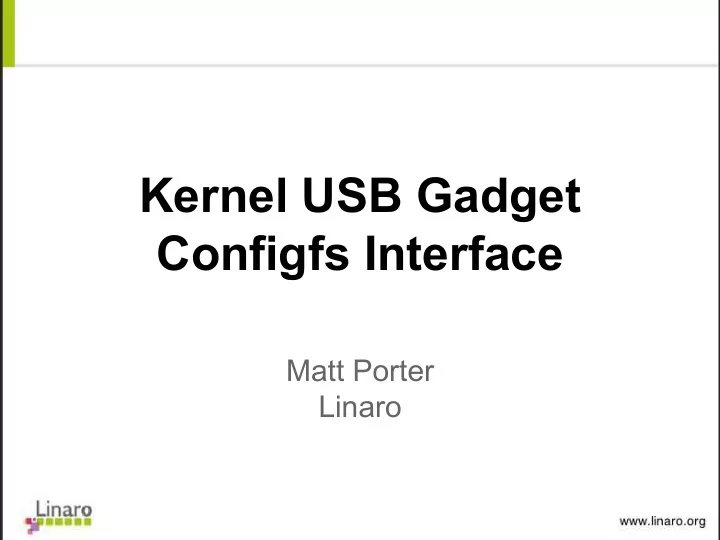

Kernel USB Gadget Configfs Interface Matt Porter Linaro
Overview ● Prereqs: understand USB ● Linux USB Terminology ● Brief history of USB gadget subsystem ● Other filesystem-based gadget interfaces ● Using USB gadget configfs ● libusbg ● Demo
Linux USB Terminology ● USB host driver - The USB Host Controller driver ● USB device driver - USB host-resident driver that supports a USB peripheral ● UDC driver - USB Device Controller driver ● Gadget driver - Driver implementing peripheral functionality
Linux USB Gadget History ● David Brownell introduces gadget framework in early 2003 ○ the community endlessly debates the term “gadget” ○ supports only monolithic gadget drivers ○ g_zero and g_ether ○ a few usb device controller drivers
Linux USB Gadget History ● gadgetfs introduced in late 2003 ○ enables userspace gadget drivers ○ MTP/PTP is a common use case http://img.ph.126.net/QzNmkfawYfnYDlg3lnza9A==/2856408063661382344.jpg
Linux USB Gadget History ● composite framework added in 2008 ○ enables multi-function (or USB composite) gadget drivers ○ existing gadget drivers slowly moved over to compositable function implementations http://lwn.net/Articles/395712/
Linux USB Gadget History ● FunctionFS added in 2010 ○ compositable version of gadgetfs ○ now userspace gadget functions can be combined with kernel gadget functions in a composite gadget ○ e.g. mass storage (kernel) + MTP (via FunctionFS) But still… something is missing...
Flexibility! We are still stuck creating custom kernel modules to glue N instances of M functions together for our unique use cases
USB Gadget ConfigFS ● Our hero finally arrives in 3.11 ● What is it? ● A userspace API for creation of arbitrary USB composite devices using reusable kernel gadget function drivers. ● Supports all major existing gadget functions except FunctionFS and mass storage in 3.11 ● 3.13 added conversion of FunctionFS and mass storage
Huh? Explain all these filesystems! ● Review ○ GadgetFS - original monolithic kernel driver that provides an interface to implement userspace gadget drivers ○ FunctionFS - rewrite of GadgetFS to support userspace gadget functions that can be combined into a USB composite gadget. ○ USB Gadget ConfigFS - interface that allows definition of arbitrary functions and configurations to define an application specific USB composite device from userspace.
But why use configfs? ● sysfs versus configfs ○ sysfs exposes kernel created objects to userspace ○ configfs allows userspace instantiation of kernel objects ● configfs is the appropriate model for creation of gadget devices ○ create the gadget device and bind to a UDC driver from userspace
Enabling USB Gadget ConfigFS Exact steps
Mounting USB Gadget ConfigFS Exact steps # mount -t configfs none /sys/kernel/config # cd /sys/kernel/config/ # ls usb_gadget # cd usb_gadget If USB Gadget configfs support is enabled we’ll have a usb_gadget subdirectory present
Create 2xACM + ECM Gadget Exact steps # mkdir g1 # cd g1 # ls UDC bDeviceProtocol bMaxPacketSize0 bcdUSB functions idVendor bDeviceClass bDeviceSubClass bcdDevice configs idProduct strings By creating the g1 directory, we’ ve instantiated a new gadget device template to fill in.
Create 2xACM + ECM Gadget Exact steps Write in our vendor/product IDs # echo "0x1d6b" > idVendor # echo "0x0104" > idProduct # mkdir strings/0x409 # ls strings/0x409/ Instantiate English language manufacturer product serialnumber strings # echo "0123456789" > strings/0x409/serialnumber # echo "Foo Inc." > strings/0x409/manufacturer # echo "Bar Gadget" > strings/0x409/product Write in our serial number, manufacturer, and product descriptor strings
Create 2xACM + ECM Gadget Exact steps # mkdir functions/acm.GS0 Create function instances. Note that # mkdir functions/acm.GS1 multiple function instances of the same # mkdir functions/ecm.usb0 type must have a unique extension
Create 2xACM + ECM Gadget Exact steps Create a configuration instance # mkdir configs/c.1 # ls configs/c.1 MaxPower bmAttributes strings Create English language strings and # mkdir configs/c.1/strings/0x409 write in a description for this device # ls configs/c.1/strings/0x409/ configuration configuration # echo "CDC 2xACM+ECM" > configs/c.1/strings/0x409/configuration # ln -s functions/acm.GS0 configs/c.1 Bind each of our function instances to # ln -s functions/acm.GS1 configs/c.1 this configuration # ln -s functions/ecm.usb0 configs/c.1
Create 2xACM + ECM Gadget Exact steps # ls /sys/class/udc/ Verify which UDC drivers are available 3f120000.usb # echo "3f120000.usb" > UDC Attach the created gadget device to our UDC driver.
libusbg ● Library providing C API to USB Gadget Configfs ○ Supports creation and removal of gadgets ○ Full API docs at http://libusbg.github.io/ ○ Source at git://github.com/libusbg/libusbg.git ● Status ○ Patch review conducted on linux-usb-devel list ○ Starting to gain major contributions in cleanups and API improvements ■ Major contributions have come from Samsung, in particular, Krzysztof Opasiak
libusbg-based 2xACM + ECM Gadget usbg_gadget_strs g_strs = { "0123456789", /* Serial number */ "Foo Inc.", /* Manufacturer */ "Bar Gadget" /* Product string */ }; usbg_config_strs c_strs = { "CDC 2xACM+ECM" }; usbg_init("/sys/kernel/config", &s); Use function enums let the usbg_create_gadget(s, "g1", &g_attrs, &g_strs, &g); compiler catch usbg_create_function(g, F_ACM, "GS0", NULL, &f_acm0); our typos usbg_create_function(g, F_ACM, "GS1", NULL, &f_acm1); usbg_create_function(g, F_ECM, "usb0", NULL, &f_ecm); usbg_create_config(g, 1, "The only one", NULL, &c_strs, &c); usbg_add_config_function(c, "acm.GS0", f_acm0); usbg_add_config_function(c, "acm.GS1", f_acm1); Default UDC will usbg_add_config_function(c, "ecm.usb0", f_ecm); just use the first or only one listed in usbg_enable_gadget(g, DEFAULT_UDC); sysfs usbg_cleanup(s);
Demo
Recommend
More recommend